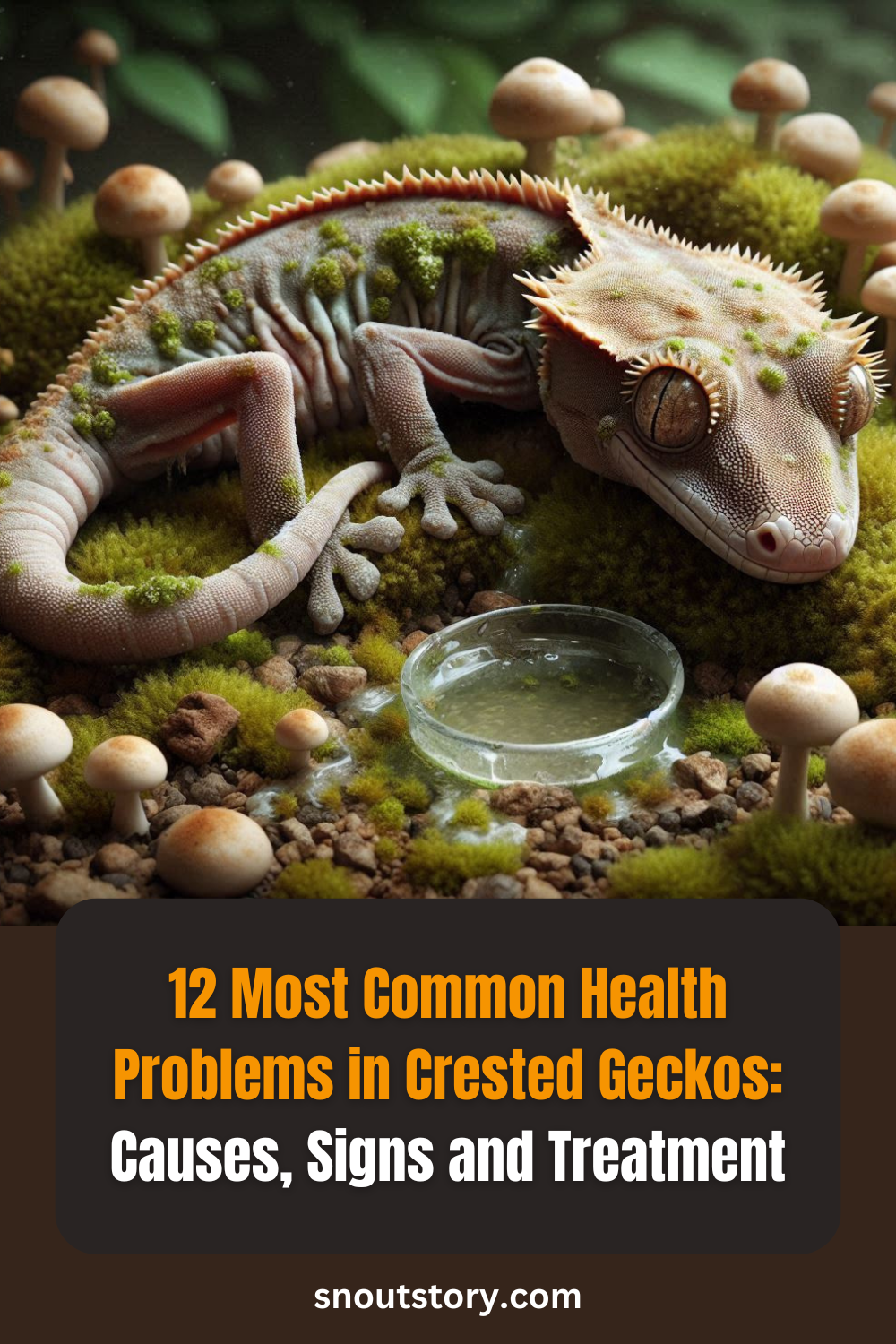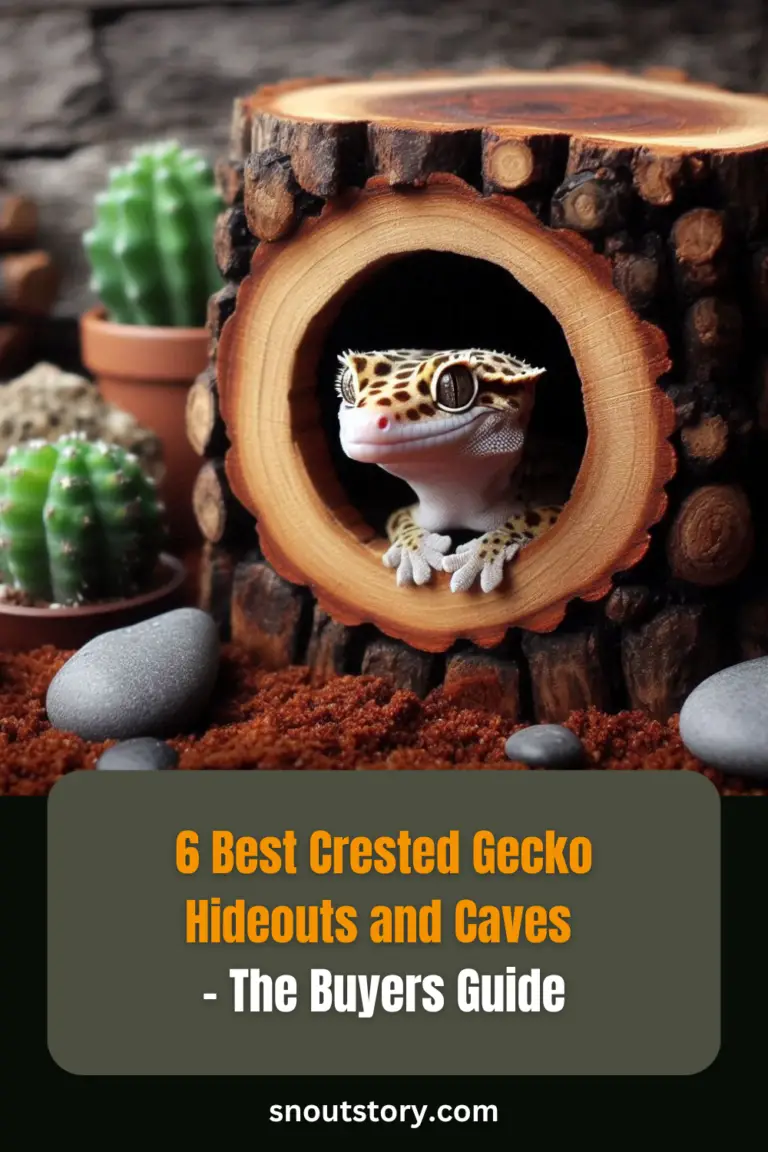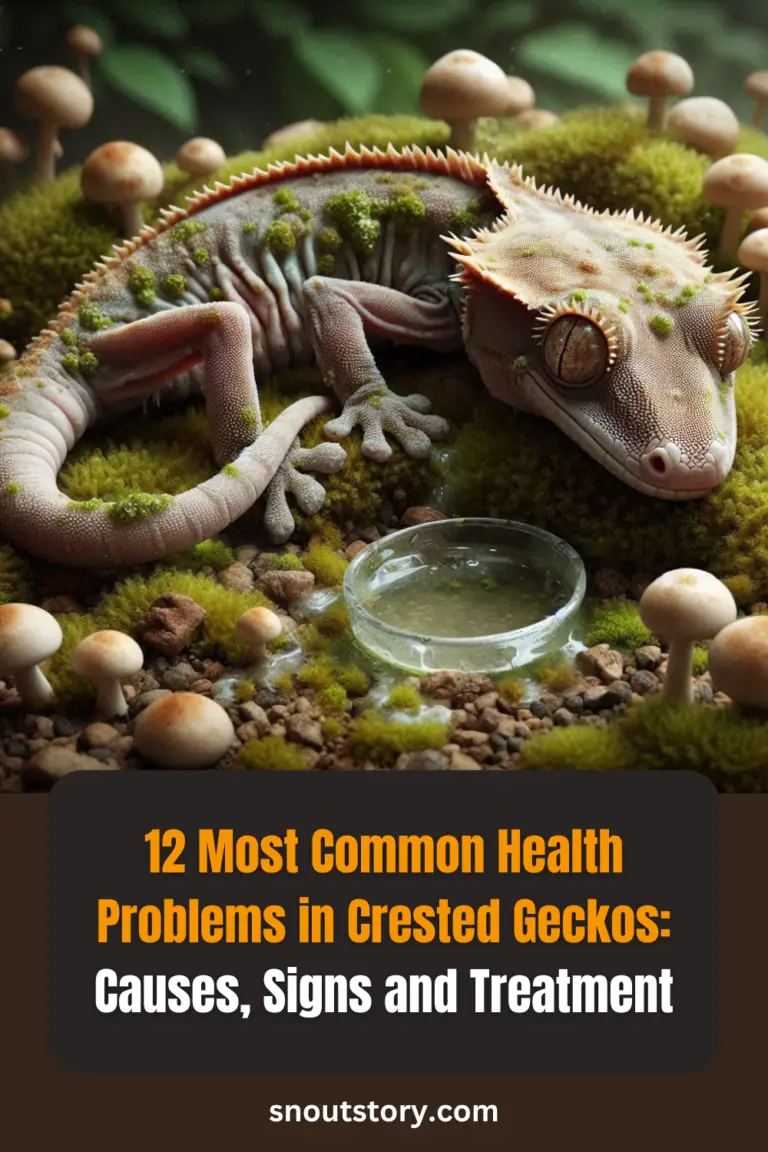Disclaimer
“This Blog is completely reader supported, for any purchase you make from affiliate links on this blog we earn a small commissions with no extra cost to you, which I use to feed my poor puppies 🥺”
Crested geckos, with their unique charm and ease of care, make fantastic pets, but like all animals, they can suffer from various health problems. Understanding the common health issues that affect crested geckos, along with their causes, signs, and treatments, is crucial for any responsible pet owner. This knowledge not only helps in maintaining their well-being but also ensures a longer, healthier life for your gecko.
From metabolic bone disease to respiratory infections and nutritional deficiencies, being aware of these potential problems allows you to take proactive measures, recognize symptoms early, and provide the necessary care to keep your crested gecko happy and healthy.
So lets understand the 12 most common health problems that can affect your crested buddies and also know the preventive actions for each of them.
Metabolic Bone Disease (MBD)

Metabolic Bone Disease (MBD) is a serious condition affecting crested geckos, often resulting from improper diet and husbandry.
Causes: Primarily, MBD is caused by a deficiency of calcium or an imbalance between calcium and phosphorus in the diet. Lack of exposure to UVB light, which is essential for vitamin D3 synthesis, also contributes to the disease.
Signs: Early signs of MBD include lethargy, lack of appetite, and soft or swollen jawbones. As the disease progresses, geckos may exhibit tremors, twisted or fractured limbs, and an overall decrease in mobility. Severe cases can lead to deformities and even death if left untreated.
Treatment: Addressing MBD involves dietary adjustments to ensure proper calcium and vitamin D3 intake. Administering oral calcium supplements and providing UVB lighting can help in mild cases. Severe instances require veterinary intervention, where calcium injections and supportive care may be necessary. Regular monitoring and proactive dietary management are key to preventing MBD and ensuring your gecko’s long-term health.
Respiratory Infections
Respiratory infections in crested geckos are common health issues that can significantly impact their well-being.
Causes: These infections are often triggered by suboptimal environmental conditions, such as low temperatures, high humidity, or poor ventilation. Stress and weakened immune systems can also predispose geckos to respiratory problems.
Signs: Early indicators of a respiratory infection include wheezing, labored breathing, nasal discharge, and lethargy. Geckos might also exhibit open-mouth breathing or frequent sneezing. If untreated, the condition can escalate, leading to a severe loss of appetite and weight.
Treatment: Addressing respiratory infections typically involves correcting the habitat conditions to optimal levels—ensuring proper temperature, humidity, and airflow. Antibiotics prescribed by a veterinarian are often necessary to combat the infection. Inhalation therapy and supportive care, such as ensuring hydration and maintaining a stress-free environment, are also crucial. Prompt and appropriate treatment can effectively manage respiratory infections, helping your gecko recover swiftly.
Nutritional Deficiencies
Nutritional deficiencies in crested geckos can lead to a range of health problems, making it crucial to understand and address this issue promptly.
Causes: These deficiencies often arise from an imbalanced diet, lacking essential nutrients such as calcium, vitamin D3, and other vital minerals. Feeding geckos a diet that is not varied or relying too heavily on a single food source can also contribute to these nutritional gaps.
Signs: Symptoms of nutritional deficiencies include lethargy, poor growth, weak bones, and deformities. You might notice your gecko has difficulty moving, a soft jaw, or swollen limbs, all of which can indicate a lack of calcium and vitamin D3, leading to metabolic bone disease (MBD).
Treatment: The primary solution involves improving the diet by incorporating a well-balanced commercial gecko food supplemented with calcium and vitamin D3. Dusting feeder insects with a high-quality supplement powder and ensuring UVB lighting or vitamin D3 supplements are essential steps. Regular vet check-ups can help monitor the gecko’s health and catch any deficiencies early. By providing a varied and nutrient-rich diet, you can prevent nutritional deficiencies and promote your crested gecko’s long-term health and vitality.
One of the best Crested Gecko food to make sure your Crested Gecko is safe from nutritional deficiencies and related diseases is Repashy Crested Gecko Food. It is a must have product for every Crested Gecko owner and I would 100% recommend it (In case you want to get it, I will leave a Amazon link below).

Parasites and Worms
Parasites and worms can pose significant health risks to crested geckos, affecting their overall well-being and quality of life.
Causes: These issues often stem from poor hygiene, contaminated food or water, and exposure to infected environments or other animals. Parasitic infections can be internal, such as intestinal worms, or external, like mites.
Signs: Common symptoms include weight loss, lethargy, loss of appetite, abnormal feces, and visible parasites on the skin. In severe cases, you might observe bloating, dehydration, or anemia, which are clear indicators that your gecko is battling a parasitic infection.
Treatment: Addressing parasitic infections involves a combination of veterinary intervention and improved husbandry practices. A veterinarian can diagnose the specific type of parasite through fecal tests or physical examinations and prescribe appropriate medications, such as antiparasitic drugs or dewormers.
Quarantining new or infected geckos can also help prevent the spread of parasites. By staying vigilant and proactive in care, you can effectively manage and prevent parasitic infections, ensuring your crested gecko remains healthy and thriving.
Mouth Rot (Stomatitis)
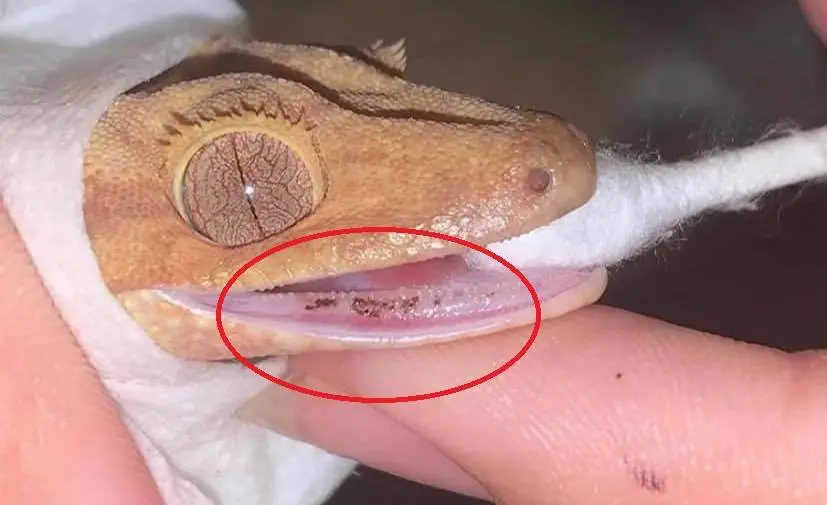
Mouth rot, or stomatitis, is a serious condition in crested geckos that requires prompt attention to prevent severe health complications.
Causes: This condition is typically caused by bacterial infections that can result from poor husbandry practices, such as inadequate tank hygiene, stress, or injury to the mouth area. Infections can also develop due to an underlying systemic illness, leading to a weakened immune system.
Signs: Early indicators of mouth rot include swelling, redness, or discharge around the mouth. You may also notice a decrease in appetite, lethargy, and difficulty eating. As the infection progresses, lesions or necrotic tissue can appear inside the mouth, and the gecko may produce excess saliva or have a foul odor emanating from its mouth.
Treatment: Addressing mouth rot involves a combination of medical and husbandry interventions. First, a veterinarian should examine the gecko to confirm the diagnosis and determine the severity of the infection. Treatment usually involves administering prescribed antibiotics to combat the bacterial infection. In some cases, anti-inflammatory medications may be needed to reduce swelling and pain.
Providing a stress-free environment and ensuring the gecko is well-hydrated and nourished will support its recovery. By acting quickly and following veterinary guidance, you can effectively treat mouth rot and restore your crested gecko’s health.
Skin Infections and Shedding Issues
Skin infections and shedding issues are common concerns for crested gecko owners, often intertwined due to underlying health and environmental factors.
Causes: Skin infections can arise from bacterial or fungal pathogens, frequently facilitated by improper humidity levels, unsanitary living conditions, or minor skin injuries. Shedding issues, or dysecdysis, are typically caused by inadequate humidity, poor nutrition, or stress.
Signs: Skin infections may present as redness, swelling, lesions, or a foul odor emanating from the affected areas. Geckos with shedding problems often have patches of retained skin, especially around the toes, tail, and eyes, which can constrict and cause further health problems if not addressed.
Treatment: For skin infections, a veterinarian will likely prescribe topical or oral antibiotics or antifungal medications depending on the infection type. It’s essential to maintain a clean habitat, regularly disinfecting the enclosure to prevent recurrence.
For shedding issues, increasing the humidity within the gecko’s enclosure can help facilitate proper shedding. This can be achieved by misting the tank more frequently or adding a humid hide. Ensuring the gecko’s diet is well-balanced with appropriate supplementation will also aid in preventing future shedding problems.
In severe cases of retained shed, a gentle soak in lukewarm water can help loosen the stuck skin, but care should be taken not to stress the gecko further. By addressing both the environmental and dietary factors, you can effectively manage and prevent skin infections and shedding issues in crested geckos.
Impaction and Digestive Blockages
Impaction and digestive blockages are serious health issues in crested geckos, often resulting from a combination of dietary and environmental factors.
Causes: These blockages can occur due to the ingestion of substrate materials like sand or bark, consuming food items that are too large or hard to digest, and dehydration. Low temperatures in the enclosure can also slow down digestion, leading to impaction.
Signs: Symptoms of impaction include a lack of appetite, lethargy, bloating, constipation, and visible lumps along the gecko’s abdomen. In severe cases, the gecko may show signs of pain or distress when its abdomen is touched.
Treatment: Initial treatment often involves increasing the enclosure’s temperature to help stimulate digestion and offering a few drops of olive oil or warm water soaks to help move the blockage. If these measures do not produce results, a visit to the veterinarian is necessary.
The vet might administer laxatives or, in extreme cases, perform surgery to remove the blockage. Preventive measures, such as providing a safe substrate, offering appropriately sized food, and ensuring proper hydration, are essential to avoid impaction and digestive blockages in crested geckos.
Eye Infections

Eye infections in crested geckos can arise from various factors and require prompt attention to prevent complications.
Causes: These infections often result from bacterial contamination, injury to the eye, improper humidity levels, or retained shed. Particulate substrates like sand can also irritate the eyes, leading to infection.
Signs: Symptoms include swelling, redness, discharge, cloudiness, or frequent rubbing of the eyes against objects in the enclosure. The gecko might also keep its eyes closed more than usual, indicating discomfort.
Treatment: Initial steps include gently cleaning the eye with a saline solution to remove debris. If symptoms persist, a visit to the veterinarian is necessary, where they may prescribe antibiotic eye drops or ointments. Ensuring a clean, humid environment and using non-irritating substrates can help prevent future infections. Regular monitoring and prompt treatment are crucial to maintaining your crested gecko’s eye health and overall well-being.
Reproductive Issues
Reproductive issues in crested geckos can significantly impact their health and breeding success.
Causes: These problems may stem from improper husbandry, nutritional deficiencies, or genetic predispositions. Environmental factors such as incorrect temperature and humidity levels can also lead to complications.
Signs: Indicators include egg binding, where a female is unable to lay her eggs, lethargy, abnormal swelling in the abdomen, and a lack of appetite. Male geckos might display decreased breeding interest or aggression due to hormonal imbalances.
Treatment: For egg binding, increasing the humidity and providing a proper laying site can help, but veterinary intervention is often necessary to safely remove the eggs. Nutritional support, such as calcium supplementation, can prevent issues related to deficiencies. Monitoring and maintaining optimal environmental conditions are crucial to mitigating reproductive problems.
In severe cases, surgical intervention might be required to address reproductive blockages or complications. Regular health checks and prompt veterinary care are essential to managing and preventing reproductive issues in crested geckos.
Stress and Behavioral Problems
Stress and behavioral problems in crested geckos can manifest due to various environmental and social factors.
Causes: These issues are often caused by poor husbandry, such as inadequate enclosure size, incorrect temperature and humidity levels, or lack of hiding spots. Overhandling and the presence of other aggressive animals can also contribute to stress.
Signs: Stress in crested geckos can be identified through signs such as excessive hiding, loss of appetite, tail dropping, and erratic or aggressive behavior. They might also exhibit signs of lethargy or unusual patterns of movement, indicating discomfort or anxiety.
Treatment: Addressing stress involves ensuring proper enclosure conditions, including appropriate temperature, humidity, and ample hiding spaces. Reducing handling and creating a calm environment can significantly reduce stress levels. If the gecko is housed with other animals, providing separate enclosures might be necessary to prevent bullying. In cases of severe stress, consulting with a veterinarian for a comprehensive health check can help rule out underlying health issues contributing to behavioral problems.
Tail Dropping (Caudal Autotomy)
Tail dropping, or caudal autotomy, in crested geckos is a defense mechanism that can be triggered by stress or physical threat.
Causes: The primary cause of tail dropping is a response to perceived danger, such as handling by humans, aggression from other geckos, or sudden environmental changes.
Signs: A clear sign of tail dropping is the absence of the tail, with a noticeable stump left behind. Geckos might also display agitation or attempt to hide more frequently before the event.
Treatment: Post-autotomy, it’s crucial to ensure the stump heals cleanly to prevent infection. Providing a stress-free environment and minimizing handling can help the gecko recover.
While the tail doesn’t regrow in crested geckos, they adapt well to its loss. Keeping the enclosure clean and monitoring the gecko for any signs of infection or further stress is essential to ensure a smooth recovery.
Calcium Deficiency
Calcium deficiency in crested geckos is a common nutritional issue that can have serious health implications.
Causes: The primary cause of calcium deficiency is an inadequate diet lacking in essential calcium, often compounded by insufficient exposure to UVB lighting, which is crucial for calcium absorption.
Signs: Symptoms of calcium deficiency include lethargy, weak or soft bones, difficulty in movement, and in severe cases, visible deformities such as a crooked spine or bowed legs.
Treatment: Addressing calcium deficiency involves dietary supplementation with calcium-rich foods and calcium powder, often with added vitamin D3 to aid in absorption. Ensuring proper UVB lighting in the gecko’s habitat is also essential. Here’s one good calcium supplement to ensure your Crested Gecko is free of all deficiencies:
Fluker’s Calcium Reptile Supplement

Regular monitoring and adjustments to diet and habitat can prevent the recurrence of this deficiency and promote the gecko’s overall health and well-being.
Summary
If you found our content helpful and valuable, you can support us by making any of your purchases (even products other than recommended in the blog) from our affiliate links (Ofc with no extra cost to you😉).
Understanding and addressing common health problems in crested geckos is crucial for maintaining their well-being and longevity. From metabolic bone disease and respiratory infections to calcium deficiency and stress-related issues, each condition requires specific attention and care.
Recognizing the causes, signs, and appropriate treatments can help prevent these health problems from escalating, ensuring your crested gecko leads a healthy and vibrant life. By staying informed and proactive, you can provide the best possible care for your pet, promoting not only their health but also their overall quality of life.
Regular veterinary check-ups and a well-balanced diet are key components in preventing many of these common health issues.
Recommended
6 Best Crested Gecko Hideouts and Caves (The Buyers Guide)
6 Best Crested Gecko Foods (Review and Buyers Guide)
10 Crested Gecko Accessories Every Owner Must Have
6 Best Crested Gecko Terrarium Tanks (Review and Buyers Guide)
Crested Gecko Heating and Lighting Requirements: Every Owner Must Know
12 Most Common Health Problems in Crested Geckos: Causes, Signs and Treatment
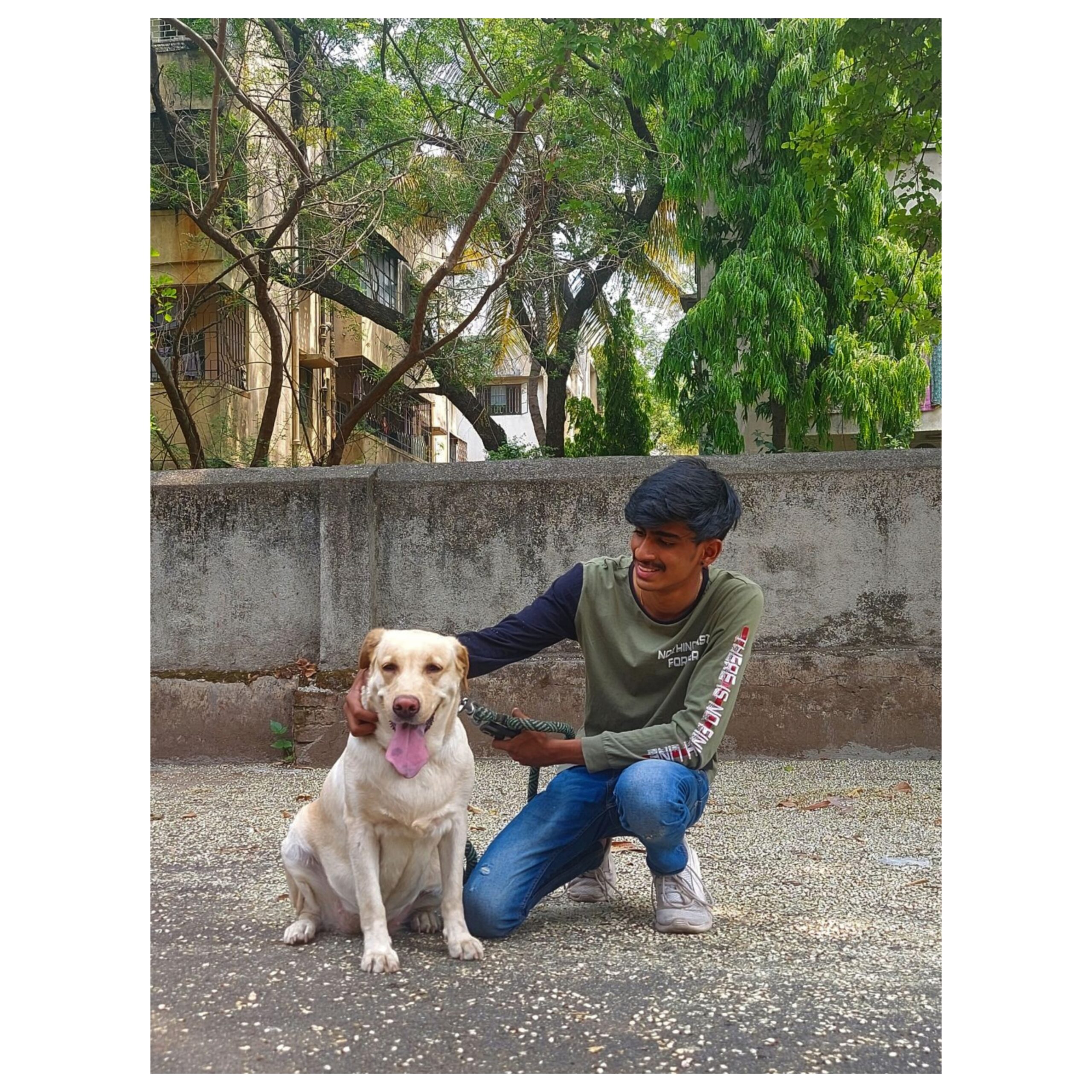
Vedant Narvekar is an experienced digital marketing expert with a profound love for nature and animals. With a career rooted in leveraging online platforms to drive engagement and promote meaningful causes, Vedant’s passion for animals inspired him to start Snout Story—a blog dedicated to educating people about pet keeping and sharing proper knowledge about caring for animals. Drawing on his expertise in digital marketing, Vedant utilizes his platform to advocate for responsible pet ownership, providing valuable insights on pet care, training, nutrition, and more. Through Snout Story, Vedant aims to empower pet lovers with the information they need to provide the best possible care for their furry companions, while also fostering a deeper appreciation for the natural world and the creatures that inhabit it.

